Mr. Wilkie Collins has here presented us with a 'novel with a purpose', and yet he has sacrificed none of his freedom and adroit resource of treatment. He has evidently, as he claims in the preface, devoted far more time and care to the study of character than in some former cases; but he is as ingenious as ever in managing his plot, in working one incident into another, and surprising us with developments which nevertheless have been well prepared for. His psychology in this case is closer and more realistic than we remember aforetime; though perhaps a certain section of the medical profession may feel a call to fight hard with him over some points. For he aims at exposing the dehumanizing effects of vivisection, believing with Dr. Haughton that persevered in without very effective checks on the side of ordinary sympathy, it may soon transform a man into a devil. But Mr. Wilkie Collins's great art is seen in tracing the purely psychological lines of the novel, a romance pure and simple, which cannot but affect the most ignorant and stolid. Readers who will not appreciate many of the points so cleverly made against vivisection, will sympathize with Hope Vere and Carmina in their sufferings and their final deliverance; with Miss Minerva, the governess, in her notable triumph over selfish passion; with poor Mr. Gallilee in his awkward position, and his noble decision though taken late; and with 'Zo' in her naive simplicities, and odd likings and dis likings, and her untainted healthy impulse, which enables her unconsciously to act with decision in a critical moment. It would not be fair for us to outline Mr. Wilkie Collins' well-laid plot: suffice it to say that in Mrs. Gallilee, the gradual ossification of the heart and healthy sympathies through excessive de mand for knowledge and the power it is supposed to bring with it, is a most original study—the gradual slipping into crime itself seeming to be but a necessary outcome of the false theory of life she has sought to exhibit in practice. Dr. Benjulia, who isolates himself in his big laboratory, and is keen to wink at bad practice in poor practitioners like Null that he may carry on his own experiments in brain disease, is drawn with decisive pencil; and Mr. Le Frank forms as original a villain as Carmina's old Italian nurse does an attached dependant. Mr. Mool, the lawyer, is one of the weakest characters, but luckily very much does not depend on him. Mr. Collins expresses his thanks to Miss Power Cobbe and some others for aid given to him: he will doubtless furnish them with aid in their noble crusade against scientific cruelty. On the whole, Mr. Collins has secured success in a most difficult experiment; one chief cause of which is that he has dealt with results and general impressions, leaving detail of technicalities behind. The story is strong as a story; and only those who have more or less deeply into the subject will be able to realize the labor Mr. Wilkie Collins has gone through by way of preparation for this work.

La Piedra Lunar
Wilkie Collins
book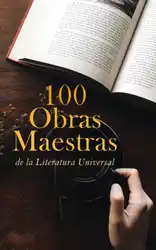
100 Obras Maestras de la Literatura Universal
Homero, Sófocles, Platón, Aristóteles, Apuleius, Seneca, San Agustín, Sun Tzu, Teresa de Jesús, Ignacio de Loyola, Nicolás Maquiavelo, Dante Alighieri, Giovanni Boccaccio, Miguel Cervantes, Hans Christian Andersen, Hermanos Grimm, William Shakespeare, John Milton, Tomás Moro, Jean-Jacques Rousseau, Immanuel Kant, Jonathan Swift, Daniel Defoe, Charles Dickens, William Makepeace Thackeray, Jane Austen, Charlotte Brontë, Emily Brontë, Robert Louis Stevenson, Oscar Wilde, Mary Shelley, Bram Stoker, Henry James, Arthur Conan Doyle, Wilkie Collins, Joseph Conrad, H. Rider Haggard, Edgar Rice Burroughs, H. G. Wells, Edgar Allan Poe, H. P. Lovecraft, Washington Irving, Harriet Beecher Stowe, Mark Twain, Herman Melville, Jack London, Nathaniel Hawthorne, Louisa May Alcott, J. M. Barrie, Lewis Carroll, L. Frank Baum, Voltaire, Victor Hugo, Honoré de Balzac, Gustave Flaubert, Alejandro Dumas, Alejandro Dumas hijo, Julio Verne, Emilio Salgari, Johann Wolfgang von Goethe, Friedrich Schiller, Friedrich Nietzsche, Franz Kafka, Nikolái Gógol, Fiódor Dostoyevski, León Tolstoi, Antón Chéjov, Mijaíl Bakunin, Virginia Woolf, Fernando de Rojas, Lope de Vega, Tirso de Molina, Francisco de Quevedo, Pedro Calderón de la Barca, Baltasar Gracián, José Zorrilla, Vicente Blasco Ibáñez, Juan Valera, Leopoldo Alas, Benito Pérez Galdós, Miguel De Unamuno, Emilia Pardo Bazán, Duque de Rivas, José Martí, Antonio Machado, Ramón María del Valle-Inclán, Jorge Isaacs, Horacio Quiroga, Federico García Lorca, Gustavo Adolfo Bécquer, Rubén Darío, Charles Baudelaire, Henrik Ibsen, Gibrán Jalil Gibrán, José Rizal
book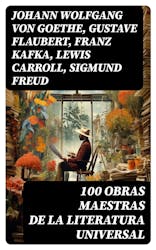
100 Obras Maestras de la Literatura Universal
Johann Wolfgang von Goethe, Gustave Flaubert, Franz Kafka, Lewis Carroll, Sigmund Freud, Henrik Ibsen, Charles Dickens, Honoré de Balzac, Mark Twain, Immanuel Kant, Friedrich Schiller, Harriet Beecher Stowe, Oscar Wilde, Robert Louis Stevenson, Edgar Allan Poe, William Shakespeare, Dante Alighieri, Giovanni Boccaccio, Bram Stoker, Charlotte Brontë, Emily Brontë, Jack London, Henry James, Louisa May Alcott, Victor Hugo, Arthur Conan Doyle, Joseph Conrad, Jane Austen, José Rizal, Edgar Rice Burroughs, Herman Melville, Jonathan Swift, Gustavo Adolfo Bécquer, Vicente Blasco Ibáñez, Benito Pérez Galdós, Jean-Jacques Rousseau, Daniel Defoe, Pedro Calderón de la Barca, Virginia Woolf, Washington Irving, Juan Valera, Horacio Quiroga, Nathaniel Hawthorne, Charles Baudelaire, Wilkie Collins, William Makepeace Thackeray, Voltaire, Apuleius, Leopoldo Alas, John Milton, José Martí, Lope de Vega, Emilio Salgari, Francisco de Quevedo, Rubén Darío, Antonio Machado, José Zorrilla, Tirso de Molina, Emilia Pardo Bazán, Fernando de Rojas, L. Frank Baum, H. G. Wells, J. M. Barrie, H. Rider Haggard, H. P. Lovecraft, Seneca, Hans Christian Andersen, Friedrich Nietzsche, Mary Shelley, Baltasar Gracián, Sófocles, Sun Tzu, Fiódor Dostoyevski, Antón Chéjov, León Tolstoi, Tomás Moro, San Agustín, Nikolái Gógol, Julio Verne, Homero, Platón, Alejandro Dumas, Aristóteles, Hermanos Grimm, Jorge Isaacs, Ignacio de Loyola, Nicolás Maquiavelo, Miguel Cervantes, Teresa de Jesús, Alejandro Dumas hijo, Mijaíl Bakunin, Miguel De Unamuno, Duque de Rivas, Ramón María del Valle-Inclán, Federico García Lorca, Gibrán Jalil Gibrán
book
La hija de Jezabel
Wilkie Collins
book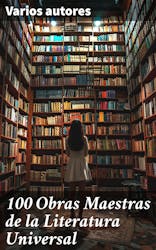
100 Obras Maestras de la Literatura Universal
Johann Wolfgang Goethe, Gustave Flaubert, Franz Kafka, Lewis Carroll, Sigmund Freud, Henrik Ibsen, Charles Dickens, Honoré de Balzac, Mark Twain, Immanuel Kant, Friedrich Schiller, Harriet Beecher Stowe, Oscar Wilde, Robert Louis Stevenson, Edgar Allan Poe, William Shakespeare, Dante Alighieri, Giovanni Boccaccio, Bram Stoker, Charlotte Brontë, Emily Brontë, Jack London, Henry James, Louisa May Alcott, Victor Hugo, Arthur Conan Doyle, Joseph Conrad, Jane Austen, José Rizal, Edgar Rice Burroughs, Herman Melville, Jonathan Swift, Gustavo Adolfo Bécquer, Vicente Blasco Ibáñez, Benito Pérez Galdós, Jean-Jacques Rousseau, Daniel Defoe, Pedro Calderón de la Barca, Virginia Woolf, Washington Irving, Juan Valera, Horacio Quiroga, Nathaniel Hawthorne, Charles Baudelaire, Wilkie Collins, William Makepeace Thackeray, Voltaire, Apuleius, Leopoldo Alas, John Milton, José Martí, Lope de Vega, Emilio Salgari, Francisco de Quevedo, Rubén Darío, Antonio Machado, José Zorrilla, Tirso de Molina, Emilia Pardo Bazán, Fernando de Rojas, L. Frank Baum, H. G. Wells, J. M. Barrie, H. Rider Haggard, H. P. Lovecraft, Seneca, Hans Christian Andersen, Friedrich Nietzsche, Mary Shelley, Baltasar Gracián, Sófocles, Sun Tzu, Fiódor Dostoyevski, Antón Chéjov, León Tolstoi, Tomás Moro, San Agustín, Nikolái Gógol, Julio Verne, Homero, Platón, Alejandro Dumas, Aristóteles, Hermanos Grimm, Jorge Isaacs, Ignacio de Loyola, Nicolás Maquiavelo, Miguel Cervantes, Teresa de Jesús, Alejandro Dumas hijo, Mijaíl Bakunin, Miguel De Unamuno, Duque de Rivas, Ramón María del Valle-Inclán, Federico García Lorca, Gibrán Jalil Gibrán
book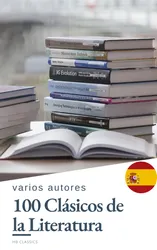
100 Clásicos de la Literatura
Francis Scott Fitzgerald, Mary Shelley, Lyman Frank Baum, Louisa May Alcott, Dante Alighieri, Jane Austen, Ambrose Bierce, Emily Brontë, Edgar Rice Burroughs, Lewis Carroll, Wilkie Collins, René Descartes, Charles Dickens, Emily Dickinson, Alexandre Dumas, Gustave Flaubert, Benito Pérez Galdós, Johann Wolfgang von Goethe, Thomas Hardy, E. T. A. Hoffmann, Washington Irving, Henry James, James Joyce, Franz Kafka, Gaston Leroux, Federico García Lorca, H. P. Lovecraft, Publio Virgilio Marón, Lucy Maud Montgomery, John William Polidori, Marco Polo, Antoine De Saint-Exupéry, Emilio Salgari, Walter Scott, Mark Twain, Jules Verne, H. G. Wells, Edith Wharton, Mary Wollstonecraft, Fernando de Rojas, HB Classics
book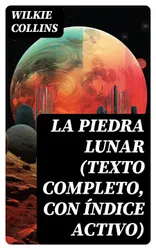
La piedra lunar (texto completo, con índice activo)
Wilkie Collins
book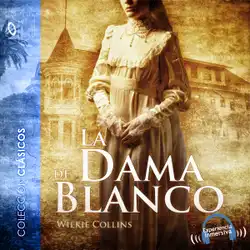
La dama de blanco - Dramatizado
Wilkie Collins
audiobook
100 Clásicos de la Literatura - La Colección Definitiva de Obras Maestras en Español para Lectores Apasionados
Francis Scott Fitzgerald, Mary Shelley, Lyman Frank Baum, Louisa May Alcott, Dante Alighieri, Jane Austen, Ambrose Bierce, Emily Brontë, Edgar Rice Burroughs, Lewis Carroll, Wilkie Collins, René Descartes, Charles Dickens, Emily Dickinson, Alexandre Dumas, Gustave Flaubert, Benito Pérez Galdós, Johann Wolfgang von Goethe, Thomas Hardy, E. T. A. Hoffmann, Washington Irving, Henry James, James Joyce, Franz Kafka, Gaston Leroux, Federico García Lorca, H. P. Lovecraft, Publio Virgilio Marón, Lucy Maud Montgomery, John William Polidori, Marco Polo, Antoine De Saint-Exupéry, Emilio Salgari, Walter Scott, Mark Twain, Jules Verne, H. G. Wells, Edith Wharton, Mary Wollstonecraft, Fernando de Rojas, Reading Time
book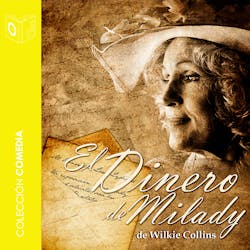
El dinero de Milady - Dramatizado
Wilkie Collins
audiobook
100 Clásicos de la Literatura
Francis Scott Fitzgerald, Mary Shelley, Lyman Frank Baum, Louisa May Alcott, Dante Alighieri, Jane Austen, Ambrose Bierce, Emily Brontë, Edgar Rice Burroughs, Lewis Carroll, Wilkie Collins, René Descartes, Charles Dickens, Emily Dickinson, Alexandre Dumas, Gustave Flaubert, Benito Pérez Galdós, Johann Wolfgang von Goethe, Thomas Hardy, E. T. A. Hoffmann, Washington Irving, Henry James, James Joyce, Franz Kafka, Gaston Leroux, Federico García Lorca, H. P. Lovecraft, Publio Virgilio Marón, Lucy Maud Montgomery, John William Polidori, Marco Polo, Antoine De Saint-Exupéry, Emilio Salgari, Walter Scott, Mark Twain, Jules Verne, H. G. Wells, Edith Wharton, Mary Wollstonecraft, Fernando de Rojas, Masterpiece Everywhere
book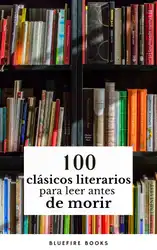
100 Clásicos de la Literatura: Tesoros Literarios Atemporales en un Solo Libro
Francis Scott Fitzgerald, Mary Shelley, Lyman Frank Baum, Louisa May Alcott, Dante Alighieri, Jane Austen, Ambrose Bierce, Emily Brontë, Edgar Rice Burroughs, Lewis Carroll, Wilkie Collins, René Descartes, Charles Dickens, Emily Dickinson, Alexandre Dumas, Gustave Flaubert, Benito Pérez Galdós, Johann Wolfgang von Goethe, Thomas Hardy, E. T. A. Hoffmann, Washington Irving, Henry James, James Joyce, Franz Kafka, Gaston Leroux, Federico García Lorca, H. P. Lovecraft, Publio Virgilio Marón, Lucy Maud Montgomery, John William Polidori, Marco Polo, Antoine De Saint-Exupéry, Emilio Salgari, Walter Scott, Mark Twain, Jules Verne, H. G. Wells, Edith Wharton, Mary Wollstonecraft, Fernando de Rojas, Bluefire Books
book
